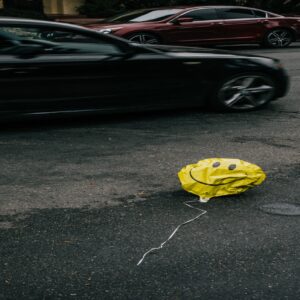Timothy Vale trudged to the only silent grave in the cemetery. In the dark, in the night, there wasn’t much to distinguish the dead. Names blurred, and flowers greyed under the wash of a faded moon. Decorations faded into shadows. All that remained distinct were the few statues adhered to their posts, irregular forms blotched with lichen.
The plot Timothy had been sent to check on had been occupied for a few years. Brittle grass covered the earth. The headstone sat straight, though already smudged with a few white lines and time. A copse of trees sat, limbs spindly and wavering, a dozen feet away.
Among it all droned a low, irregular buzz. If Timothy listened closely, sometimes a few notes of an individual song separated themselves from the catastrophic symphony.
Every human body released a song as it decomposed. As individualized as thumbprints, the notes clung to the decaying flesh, sunk down into the skeleton. They plucked along the rotting tendon and muscle, settled into what would be left behind. The bones hummed with the skeleton’s final refrain.
Timothy tucked his headphones over his ears and shoved a metal pole a few inches into the soft earth. In past years, a partner would have stood by his side to help him monitor the equipment. Budget cuts had determined that experienced caretakers were capable of handling silent graves alone. The bottom line said it was more expensive to pay for backup than any potential insurance claims.
Timothy listened closely. Flicked at the dial fixed to one earpiece, then listened again.
The report was accurate. Mister Henry Clarke had fallen silent.
Timothy rubbed his forehead with his knuckles, summer sweat beading on his hairline. Whenever he worked the night shift, it was his duty to pause. To listen. Once, it had been the caretakers who caught any silent graves during a slow evening, but more often nowadays news of missing songs filtered in from visitors. Mourners who came to hear the noise of their lost loved ones. Sometimes, the trek out ended in a false alarm. Newcomers often didn’t know to listen for the softer, subtler melody emitted when the flesh was gone.
Slinging his headphones around his neck, Timothy reached for his shovel. The handle was worn smooth, first by his uncle’s hands, now his. An accidental family business. After his college graduation, Timothy had struggled to find a job. He’d applied to dozens, wasted hours on online applications, trudged through interviews, and failed to secure any position until his uncle personally vouched for him, for this. All that was needed for caretaking was a strong stomach, muscular arms, and good ears.
The shovel dug in easily, flipping dirt in a steady rhythm. The earth in the cemetery was soft, pliant after a long month of summer storms. At a steady pace, it would only take Timothy an hour or two to reach the coffin. It would have been easier to have another set of hands around. Those were saved for emergency cases now, the ones where Timothy might need to call in a supervisor. After ten years on the job, Timothy knew how to eyeball unrest. The grave had been silent less than a day; the inhabitant hadn’t had long to stir.
He hadn’t meant to stay at this so long, to become the kind of expert his uncle had been. It’d taken a while to realize it was hard to transfer his newfound skills elsewhere, that it felt worse to have this on his resume than to leave the years blank.
Shovel met dirt. Dirt met more dirt. Muscle burned, and stretched, and ached, because no matter how often Timothy dug up the silent, his body refused to acclimate completely. It protested all the way down to the coffin, metal ringing on metal.
The noise chimed, discordant, unmatched by the notes surrounding Timothy now that he was a few feet under. The songs of the dead were louder here by proximity, but the noisy corpses were no more aware of his presence than a deer would be of a singular tick clinging to its hide.
Timothy cleared dirt from the dull grey coffin lid. In the grave, the angle harsh enough to cut out any starlight, Timothy switched on his flashlight. That went between his teeth, molars clenching down hard on the plastic. Two hands were needed to undo the safety latches, keeping the lid secured.
The pests had still gotten in. The inevitable couldn’t be stopped, even with chemical preservation, even with metal and velvet offering a forever home.
Henry Clarke died in winter three years back. The body he’d left behind, flesh and blood and muscle and bone, had made its best effort toward holding itself together for another summer. A putrid, musty scent billowed from the coffin’s confines, a puff of rancid air, the body’s real final exhale.
Henry remained, in places. The settling hadn’t completed. Strips of flesh clung to the skull, adhering limp darts of grey hair into place. It fell from the metacarpal and phalanges in ribbons, left the chest of his suit jacket misshapen with the leftovers.
Adjusting the flashlight, Timothy glanced upward. Empty dirt walls shuddering with disturbed insects bordered a night sky smattered with stars. Once, his uncle would have stood there, hands on knees, half-leaning into the plot. Timothy would have been impatient, ungrateful, wanting to prod him away. To prove how much he’d learned. To complete the job and help someone, even if they were beyond knowing they needed assistance.
His uncle had retired the previous year. Timothy visited him every other weekend.
Setting the shovel aside, Timothy reached into the coffin.
Henry Clarke moved.
Bone clattered against metal. Reluctant stripes of muscle and tendon flexed. A hand lifted and Timothy leaned backward, heels scattering dirt. Beetles and mealworms spilled into the empty air between him and the body.
“Settle,” Timothy said, though he knew Henry Clarke was beyond communicating. Timothy’s voice joined the soft swell of lullabies snaking through the earth surrounding him. It was easier down there to hear them, the songs of Henry Clarke’s neighbors.
Bodies like his, the ones who went silent, were often filled with rage instead of music. The flailing, unmoored anger made them dangerous, made it so Timothy was paid well despite the accidental, unwanted way he’d fallen into his career.
Henry lurched again, and Timothy moved, dodging closer to the coffin. Looking downward, he aimed the flashlight into the stained velvet interior. Pieces of the lining had softened, rotting beneath Henry’s resting weight, various fluids released to the wild during decomposition and the infiltration of the insects who’d welcomed him to their home.
One of Timothy’s hands searched among the irregular divots, felt along the shifting lines of bone. The skull juddered forward, jawbone clattering.
Timothy blocked with a quick elbow, the way he’d been taught. It had felt like an extended college course, the on-the-job training. Rattling off skeletal groupings at his uncle’s request. Memorizing the lines of a body defleshed and how to note an absence in the cohesion. As time passed and things disintegrated, sometimes a bone unexpectedly slotted out of place, knocking the song off-key.
Waking the dead.
Timothy’s fingertips prodded a gap in the lining. A strong patella jabbed at his thigh. The bruise would be thick, more black than blue. Light flashed across half-empty sockets as the flashlight swung erratically. It spotlighted the hole in the lining. The moving skeleton. The flash of white visible beneath the small gap, where a distal phalange had slipped through. The bony hand scrabbling at Timothy’s forearm, wrist, arching toward his neck.
Complete the skeleton. Let the lullaby send it back to sleep.
His uncle, thirty years into the gig, had made it sound easy and exciting, all at once. The perfect job for someone who needed money and a temporary purpose.
Timothy’s fingertips pinched the phalange just as a sharp, broken ulna cut across his palm. The sting was doubly painful in its sudden jolt so close to finishing the job. He drew back, one hand still half-shoved into the coffin’s depths. Tiny insect legs feathered across his fingertips. The cut on his other hand was shallow, but the ulna struck again, cutting deeper, dragging a guttural and unconscious sound from the back of Timothy’s throat. His hand shuddered forward, wrapped in a wave of fresh pain, and he crouched over the coffin-like some rabid gargoyle. Kicking out a heel to knock Henry Clarke back a few inches, Timothy grabbed his flashlight. The plastic slipped beneath his palm. The pain doubled his vision. The beam swung and shone directly into his eyes, blinding him with righteously angry light as he knocked Henry Clarke in the skull.
Timothy worked his hand free of the lining, knuckles scraped, beetles scattering. Using the flashlight, he knocked Henry Clarke back again, down into the depths of his coffin, right where Timothy needed him. The prodigal distal bone, held in too tight a grip, slotted into the small gap in Henry Clarke’s remains.
The bones stilled. Timothy listened to the rhythm of his own ragged breath, echoing back at him within the confines of the dirt surrounding him.
Steadily, quietly, the skeleton beneath him resumed its song. Part of it muffled, coated with half-digested flesh. But the notes were pure, and strong. Something gentle. Something to sleep to.
Timothy, exhaling, finally looked at his hand.
The last finger was missing down to the proximal phalange.
His uncle had always tried to chasten him into wearing gloves. On the night shift, there was never another soul around to harass Timothy into bringing more than the required gear.
Swallowing down any remaining inclination toward a fight, Timothy wrapped his hand in a few spare tissues and delicately inspected the coffin’s interior for his missing finger. That went into his pocket with a sad, small squelch. His throat worked a moment at the noise, but his uncle’s advocation for Timothy’s strong stomach had been based on truth.
The coffin’s safety latches secured, Timothy crawled from the grave. He’d leave the job of refilling the dirt for the day shift. The night’s report, and the insurance claims, and upcoming hospital visit would take enough time.
Timothy was halfway back to the caretaker’s office when he heard it; the flesh had already started to deteriorate. His own fingertip, singing where he’d stashed it. The notes were uncertain and miniscule. The bones there would need to wait a while for the rest to join in. Hand over his pocket, Timothy listened close to the lullaby of his bones.




